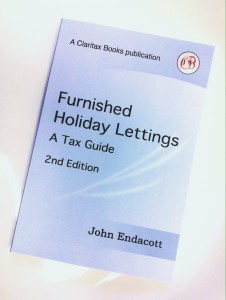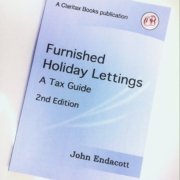Fresh off the printing press, the second edition of Furnished Holiday Lettings – A Tax Guide was prompted by the Pawson case and the implications for business property relief on holiday lets. It has also been updated with revised HMRC guidance in relation to “dwelling houses” and new rules for fixtures in property. This clear and practical guide expertly written by taxation specialist John Endacott includes useful guidance inspired in response to the furore over the proposed abolition of the furnished holiday lettings tax rules and the changes to the Finance Act 2011. 
This informative book is a practical guide to the tax rules relating to furnished holiday homes and includes in its comprehensive contents, information on:
- Background to the tax rules
- Property letting or trading?
- Meeting the qualifying criteria
- Furnished holiday letting in the EEA
- Sale of a property
- Holiday lets and exemption from inheritance tax
- Succession planning for Furnished Holiday Lettings
- Rates, VAT and other UK taxes
Providing clear worked examples to explain the taxation implications of owning and running furnished holiday lettings, it makes a useful reference for your accountant and investors wishing to increase their own knowledge and is therefore recommended to:
- Existing furnished holiday letting owners
- Prospective holiday home purchasers looking to let their second homes
- Those considering converting barns or out buildings into furnished holiday lettings
Furnished Holiday Lettings – A Tax Guide 2nd Edition is available to purchase here.
For advice on specialist insurance for furnished holiday lettings get in touch with our dedicated team on 01237 429444.




